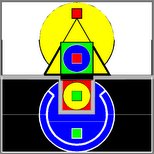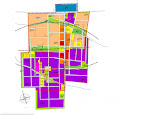
Thomas Jefferson brought hope to united statesians with urbanism configured by neo- palladian architecture. Paul Virilio says filosofy is a city product and not the other way around. Thoughts are molded by space, movement and relations in those spaces.
Supposing the States is, want it or not, a world reference if not the world's reference, let's ask the following questions: Is the faith "united statesians" have in themselves (I don't like when they call themselves Americans), based on the idea that they are the last and best hope of the World? Do they think in other words they are the chosen ones to lead one destiny? Does this give them the right to control all before them? Isn't their ultimate good an illusion, and immediate evils a paranoia, that justifies to cling on that same illusion? Must their divine mission be assumed by the rest of the world? Will Palestinians suffer until they recognize Israel, as it wants to be recognized? When they call themselves Americans does it metaphorically mean the people of the new world to come, opposed to the old world? Does the league of democracies want peace with power? Doesn't freedom actually mean free will, and that's what the world hates about the States, the "status quo" and psycho-perception it has developed in it's people, brainwashed like in Fahrenheit 451? That to me means, thinking and believing it's Self fulfilled prophecy as redemptive of the truth is taking place, while the world is really being consumed and controlled by them? How can what we believe and what really happens with what we actually do, be soooo opposite? The answer: We see white hopes, but trapped in black boxes. Trust our God, the God we trust? To survive or to live?
El que sobrevive se posiciona en el mundo vertical
El que vive encuentra su lugar en el mundo horizontal
Lamentablemente el que se posiciona, crea dinámicas donde nadie puede encontrar su lugar en el mundo horizontal, por estar sobreviviendo en el vertical que se extiende como un virus.
Por eso la visión horizontal y vertical que acusa Morris, no son compatibles, es otro tipo de dualidad, en la que la triste realidad se intenta compensar con un proyecto infactible. Ya que hay un hecho muy simple:
“El que disfruta sobreviviendo no necesita para que vivir.”
Brasil o África son ningún “picnic” por el abuso global principalmente, por lo apretado que se pone el mundo con este modelo de “sobrevivir” que insisto es la idea de vivir en un perpetuo “éxodo”, de una oscuridad mal encarada que se pretende sublimar con luz salvadora. Más que la necesidad de siempre tener que existir un propósito para hacer, existe un temor de no hacer por un propósito, parece dialéctica barata, pero es clave entender la trampa detrás de esta aparente dialéctica barata. La tesis es la reacción de una antítesis y en la antítesis esta el misterio y tabú social. El placer no reporta utilidad, el carnaval fue transformado en espectáculo por productores de eventos. El tercer mundo vive de turistas en busca de este vivir local, misterio en su paradigma desarrollado, aparentemente resuelto? y por otra parte algo tácito para el tercer mundo, un tesoro cultural que nadie defiende o estudia como fenómenos vitales que necesitan protegerse de manera intra y no intergrupal en términos de Edward Hall. Y aquí en tema de plata: para disfrutar sobrevivir se requiere un desgaste enorme, vivir basta saber estar. “Enjoy the pleasures of success”, es una dinámica sofocante.
Cuando un gringo que se va a vivir a Brasil dice:”It's embarrasing that I have to admit that experiencing pleasure without guilt is something I still struggle with.” No puedo dejar de recorder la relación que hace Weber entre los protestantes y el capitalismo, y como en las elites conservadoras chilenas se han introducido movimientos (Opus, Legionarios) con tintes más protestantes que católico paganos, ya que las elites liberales (jesuitas) son desde mi visión y de Pedro Morandé, masónicas. “Los ingleses de América Latina”, para mi no es ningún piropo. “Y verás como quieren en Chile a un amigo cuando es forastero”, ¿esto es ser amable o esnob? Chile es amigo del forastero, se ha abierto de piernas a la globalización.
Tener para sobrevivir, protegerse de sentirse vivo, ignorar con el trabajo y la ocupación el ocio, el ne-gocio es negar el ocio, ese ocio que abre a vivir, que no tiene que ver con austeridad o sencillez, tampoco con ser hippie, “it’s not about the money”, although some will undertsand it in that sense.
viernes, junio 06, 2008
ABOUT THE STATES
Suscribirse a:
Comentarios de la entrada (Atom)



























































































.jpg)








































































































0 comentarios:
Publicar un comentario